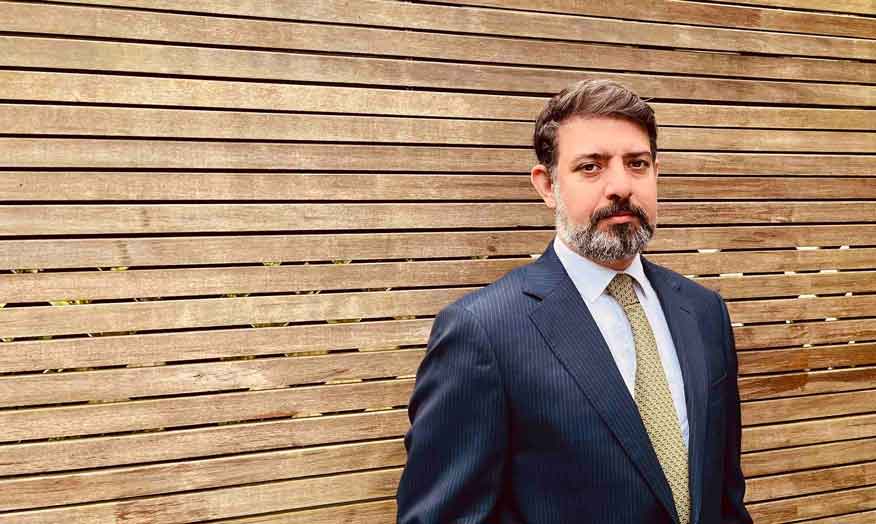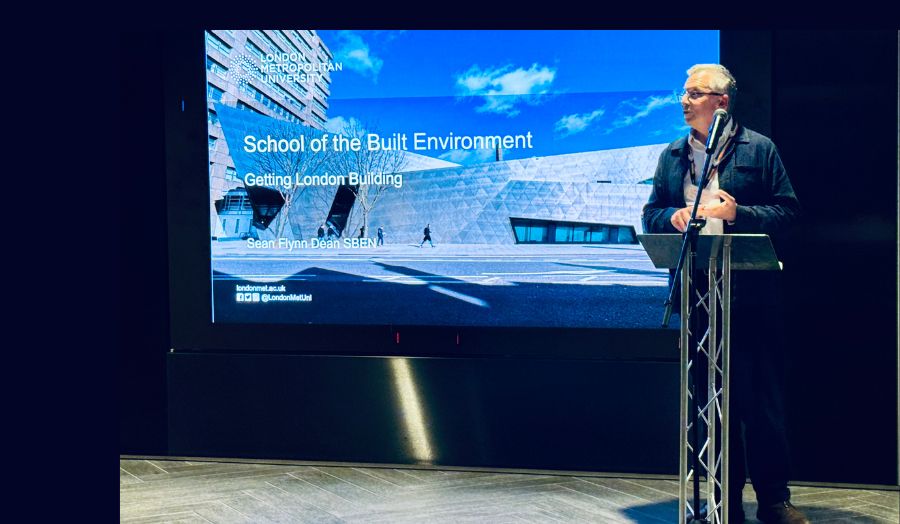Apply for this course
Please select when you would like to start:
Use the apply button to begin your application.
If you require a Student visa and wish to study a postgraduate course on a part-time basis, please read our how to apply information for international students to ensure you have all the details you need about the application process.
Why study this course?
The demand for expert construction project managers is steadily on the rise, both in the UK and internationally. On our Construction Project Management MSc you’ll become an expert in your field, opening the door to better career and salary prospects. If you have ambitions to manage projects and make a real-world contribution to the built environment then this could be the perfect course for you.
London Met’s School of the Built Environment has designed this course to provide you with the skills needed to become a well-practised and valued project manager in the construction field and the expertise to lead on complex projects globally.
By working on real world projects, you’ll engage in authentic learning and assessment and will have the opportunity to work in collaboration with national and international organisations. To further advance your career prospects, we have strong links with employers active in all aspects of the built environment and involve them in our curriculum design.
Taught by industry experts and practitioners, you’ll gain the knowledge sought after by employers including how to motivate and lead project teams, keep to tight deadlines and budgets and achieve your client’s goals. You will gain an awareness of the challenges faced when delivering projects within and outside of the UK, taking into account differing cultural and national contexts.
What’s more, you’ll study in our vibrant Holloway campus, within a 10-minute tube journey of the City and West End, both of which are full of life, culture and opportunity.
Make your career aspirations a reality
If you have ambitions to manage projects and make a real-world contribution to the built environment then this could be the perfect course for you
Study in the heart of London
You’ll study in our vibrant Holloway campus, within a 10-minute tube journey of the City and West End, both of which are full of life, culture and opportunity
Support your studies with extra-curricular activities
You’ll have the opportunity to engage with industry organisations and projects through site visits, guest lectures and fieldwork, keeping you at the forefront of this dynamic sector
Course modules
The modules listed below are for the academic year 2024/25 and represent the course modules at this time. Modules and module details (including, but not limited to, location and time) are subject to change over time.
Year modules
Applied Research Project
This module currently runs:all year (September start) - Thursday afternoon
(core, 60 credits)
The module will provide students with the opportunity to undertake an in-depth study of a subject which is of personal and subject interest in the field of the built environment. Students may focus their research upon a topic or problem relevant to their current programme of study and based upon an academic subject of interest, their current work practice or recent work experience or placement. The submission will take the form of a dissertation.
Students are encouraged to develop their critical thinking and undertake rigorous and theoretically informed research. The module will develop the student’s understanding of the linkages between conceptual issues, subject area, and research methods.
The module will introduce students to research methods and strategies which are appropriate to their area of study. It will provide the student with experience in the planning and implementation of a research project and the subsequent writing up of research findings in a dissertation and encourage students to undertake critical thinking.
Read full detailsProcurement and Contract Practice
This module currently runs:autumn semester - Monday afternoon
(core, 20 credits)
The module aims to provide the student with a critical awareness of the processes behind successful procurement and contract management of a construction project. It aims to develop their knowledge and understanding of the legal and contractual context within which construction projects operate and the project context’s which influence the procurement strategy. The module will explain the fundamental concepts of procurement and contracting as well as examining the project procurement management knowledge area processes: plan procurements, conduct procurements, administer procurements, and close procurements. It also covers project outsourcing techniques and tools including soliciting, selecting, and managing subcontractors. It will examine the construction project procurement cycle and the statutory and legal frameworks which need to be accounted for. Particular attention will be given towards sustainable procurement and the influence of an organisation’s Environment, Social and Governance (ESG) Strategy on project finance and procurement.
The knowledge gained will enable the student to propose project contract and procurement strategies for planning, decision making and control.
By the end of the module students should be able to critically evaluate the following:
- the principles of contract law.
- the roles and responsibilities of the contract parties.
- contract selection and procurement routes.
- procurement strategies available for different project types
- the impact of governance on a project procurement strategy for public and private projects
- how a procurement method contributes to an organisation and/or projects ESG goals
- the use of digital tools to aid procurement
- standard form of contracts and their procurement terms.
- techniques to manage disputes towards resolution
Project Management Practice
This module currently runs:autumn semester - Monday morning
spring semester - Monday morning
(core, 20 credits)
The module aims to develop students' knowledge of leading contemporary project management concepts and practices and how these contribute to the successful delivery of construction projects, including the management of risk and construction logistics. It will take a detailed look at construction, commissioning and handover stages of a project and aspects of stakeholder management within the same. It will consider the role of construction project management in the global move towards a sustainable and low/zero carbon built environment.
The syllabus is guided by professional body project management bodies of knowledge and codes of practice (such as the APM and CIOB). The module explains the operational phases of project management including pre-construction, construction, and handover.
By the end of the module students should be able to critically evaluate the following:
- the challenges in leading a complex project
- effective methods to manage the operational project stage
- the competencies required of their project team
- project value
- project constraints
- the link between project change and risk
- the practical contributions a project and project manager can make towards a sustainable low/zero carbon built environment
Project Management Principles
This module currently runs:autumn semester - Monday morning
spring semester - Monday morning
(core, 20 credits)
This module will introduce the student to the fundamental theories and concepts for successful project management. It examines the theory behind project management and best practice in the built environment industries in a local and a global context. It will consider how organisational strategic objectives drive projects and the role the project manager performs in the early stages of the project lifecycle, including the development and use of models to drive portfolio and project management. Following this it will move the focus to the operational stage of the project and how the key project objectives are identified and managed towards a successful project completion.
The syllabus is guided by professional body project management bodies of knowledge and codes of practice (such as the APM and CIOB). The module explains the strategic context within which projects operate to enable the students to understand that a project needs to have a strategic fit with the organisation's wider aims and ambitions. By the end of the module students should be able to critically evaluate the following:
- the link between organisational strategy, programmes, and projects
- project economics
- project finance mechanisms
- project management methodologies and their underpinning theories
- the challenges of leading a complex project
- the contribution project management makes towards a sustainable built environment
- the responsibilities of the modern global project manager
- strategies to monitor and control the complete project lifecycle
Project Planning and Delivery
This module currently runs:autumn semester - Thursday afternoon
(core, 20 credits)
The module aims for the student to develop a critical awareness of project planning and delivery principles alongside developing the skills necessary to deploy them to manage a construction project. Through enquiry-based learning it will facilitate a project scenario to allow the students to deploy the tools necessary to successfully plan a project and monitor a project's resources.
The syllabus is guided by professional body project management bodies of knowledge and codes of practice (such as the APM and CIOB) and the module explores the pre-construction and delivery phase of the project to enable the students to understand that detailed planning of a project is needed to help in the successful delivery of the construction phase. By the end of the module students should be able to critically evaluate the following:
- project constraints and how they are identified and accommodated.
- project risks and strategies to accept, avoid, control, transfer and monitor them.
- internal and external stakeholders to the project and how to manage their expectations.
- the requirements of a project delivery plan for the pre-construction and construction phase of a project and once produced how to control it throughout the construction phase.
- Produce and maintain a detailed project programme
Sustainable Built Environments
This module currently runs:spring semester - Monday afternoon
(core, 20 credits)
The module aims to develop a critical awareness of the background and drivers for sustainable development. It will explore the development of the sustainability agenda, different approaches to sustainable development and the key trends in society that affect, and are affected by, the built environment. It will consider how climate change, urbanisation and other factors are placing pressure on the built environment across the globe to deliver agile and appropriate responses to challenges such as accelerated climate change, extreme weather and societal change.
The knowledge gained will enable the student to understand the impact of the built environment sector on the sustainability agenda.
By the end of the module students should be able to critically evaluate the following:
- the background behind the sustainability in the built environment agenda
- drivers for change and appropriate responses
- the role of development in maintaining and sustaining the wider environment
- techniques that can be adopted to reduce our built environment operational energy demand
- the different types of infrastructure and their role in achieving sustainable built environments
- strategies to ensure energy security positioned within a low carbon energy mix
Building a Successful Project Team
This module currently runs:spring semester - Thursday morning
(option, 20 credits)
The module aims to develop a critical awareness of the people dimension of projects and will address the principles of project team development. It will look at the role soft skills play in the successful delivery of a project and how a mastery of leadership and motivating your project team can help you build and maintain a successful and focussed project team. It will address how to distinguish between different types of change projects and propose techniques in leading teams to achieve organisational change
The knowledge gained will enable the student to develop strategies to form and maintain integrated project teams.
By the end of the module students should be able to critically evaluate the following:
- the role of soft skills in project management
- stakeholders and relationships present in a project
- means to select and maintain a project team
- group dynamics
- managing change
- the role of corporate social responsibility in project delivery
- methods to manage and resolve conflicts within a project team
- decision making and problem-solving processes associated with complex and unpredictable solutions.
- Gender representation within the built environment
Managing Risk and Uncertainty
This module currently runs:spring semester - Monday afternoon
spring semester - Thursday afternoon
(option, 20 credits)
The aim of this module is to provide the student with knowledge and understanding of risk and uncertainty theories and an appreciation of the differences between risks found on different project types.
Responding to today’s highly complex project landscapes, the module looks at risk management in a contemporary way, including complex projects which involve an unusual degree of uncertainty and unpredictability.
The module will introduce students to risk analysis techniques and how they can help the project team in making decisions under a highly dynamic project landscape. It will provide students with the tools to identify and assess risk and make informed decisions including how to manage risks within the context of a changing project environment. The module looks at “managing change” from the perspective of the risks involved.
By the end of the module students should be able to critically evaluate the following:
- The level of individual element and overall project risk
- Project complexity and risk
- Tools available to manage qualitative and quantitative project risks
- Appropriate means to manage risk
- The links between project change and risks


















.png)






